The State Of Responsibility 2023: Distributor Benchmarking
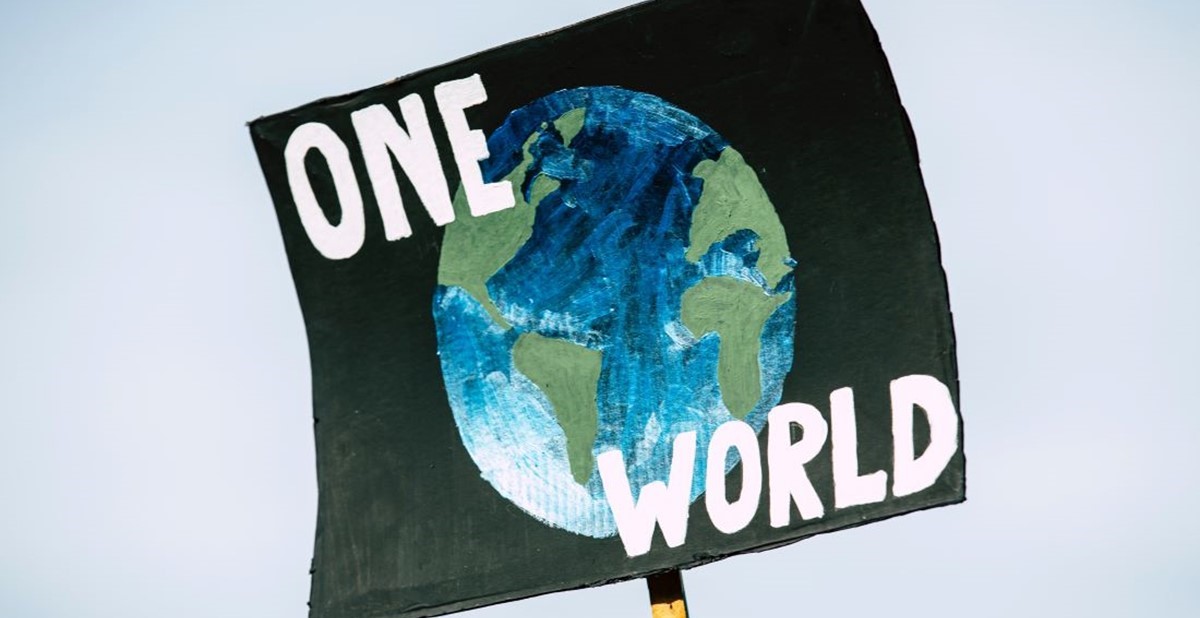
Over the spring and summer of 2023, PPAI Media asked industry distributors of all sizes a series of questions to assess their status on a number of CSR fronts.
The following survey questions, which were also used to score the inaugural PPAI 100's Responsibility category, reveal how distributors at multiple competitive bands in the marketplace compare to one another.
Distributors: How does your firm stack up to the competition, and are there areas you can improve or update?
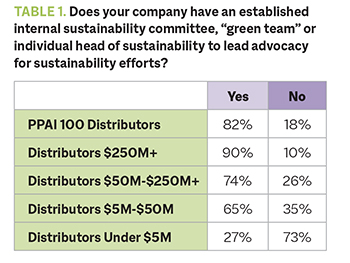
“It's great to see that many distributors are creating the space for a dedicated person or team to lead this type of work,” says Mel Hubner, director of social impact and sustainability at Raleigh, North Carolina-based Brand Fuel. “It requires an innovative mindset, expertise and passion for elevating our industry. Engaging the team in the company’s sustainability efforts is also critical, so establishing an internal committee can drive lots of positive change as well.”
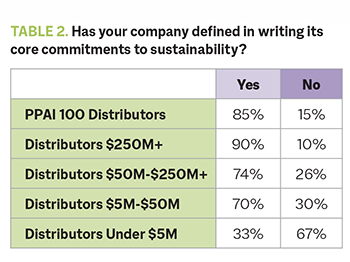
“Large companies with revenues exceeding $250 million are at the forefront of internal sustainability initiatives, often forming dedicated committees and documenting their sustainability commitments,” says Bart Simpson, president of Hixson, Tennessee-based Flywheel Brands. “They also lead in sustainability audits, office recycling programs and investments in renewable energy. Moreover, these companies have more robust charitable give-back programs and prioritize DEI training.”
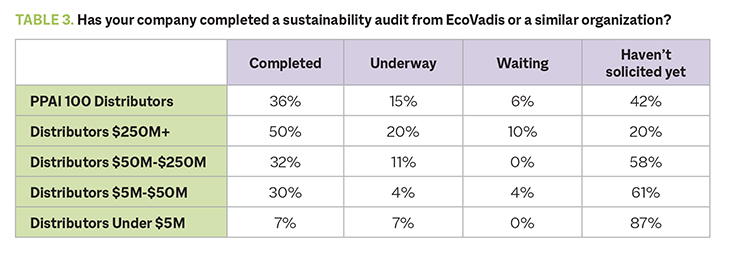
David Tate, president of Memphis, Tennessee-based Signet, speculates that the data shown above shines a light on how distributors are truly faring when it comes to sustainability. “Most all respondents are stretching to say yes,” he says. “Note the suddenly low percentage for the EcoVadis audit and you most likely get a truer picture of percentages, or at least somewhere in the middle.”
Regardless of how accurate the percentages may be, Tate stresses that there is a “great need” for the industry to be “mindful and purposeful” about CSR. “The real key is, are we as an industry dealing with these issues – and the answer is yes,” he says. “The good news is that more and more will make progress.”
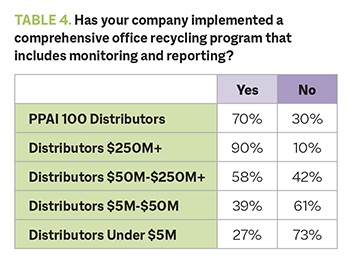
“As usual, the larger companies have a larger percentage of participation in all the areas because they most likely devote personnel and resources to them and can justify them due to their volume,” Tate says. “Smaller distributors aren’t willing to deploy the resources due to the cost.”
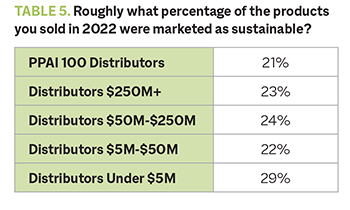
“In order to ensure we’re moving in the right direction and setting realistic but also ambitious goals, distributors must be able to measure and track our sales based on impact-driven categories, such as sustainability, DEI, small business, etc.,” Hubner says.
“It’s not a secret that most of us are still trying to figure out the most efficient and accurate way to do that,” she adds. “At Brand Fuel, we believe this process starts by increasing communication and collaboration between distributors and suppliers. We all hold a piece of the puzzle – we just need to come together and create a common system for categorizing products and tracking sales.”
A seeming anomaly is that PPAI 100’s industry-leading distributors say they sold fewer products marketed on sustainable grounds than other segments. Alok Bhat, PPAI’s market economist and senior manager of research, explains there is likely some self-selection bias among smaller segment companies that elected to take the responsibility survey. Likewise, larger companies may be more careful about their claims to avoid greenwashing concerns.
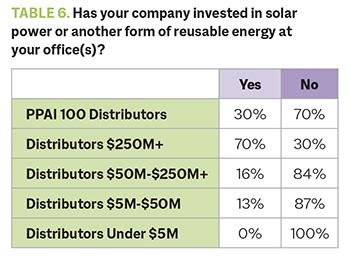
Considering their lack of resources, it’s no surprise that distributors with $50 million and under in revenue face challenges in matching the sustainability efforts of their larger counterparts. “Still, the survey underscores the growing importance of CSR, highlighting the need for all businesses to incorporate sustainability into their strategies to meet evolving consumer and stakeholder expectations,” Simpson says.
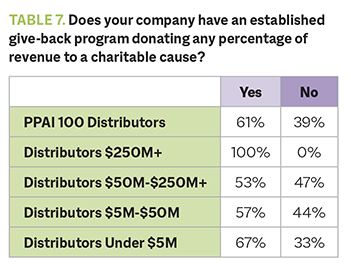
Philanthropy is a pillar of the promo industry, as evidenced by more than half of distributors in each category having an established give-back program. Many firms partner with charities for fundraising efforts and volunteering opportunities to make a difference in their community.

When dealing with Fortune 500 clients with diversity departments and sustainability groups within their companies, Tate claims they rarely have passion for either effort.
“As long as one gives them lip service, they tend to move on,” he says. “Many of our large clients give it lip service as well. Of course, one needs to check all the boxes for sourcing, RFPs, etc., but past that, we still don’t see much interest in the compliance factor. That said, even if we don’t have to comply nearly as much as indicated by clients, we still need to be doing it to be good citizens, stewards of the earth and for so many other altruistic reasons.”
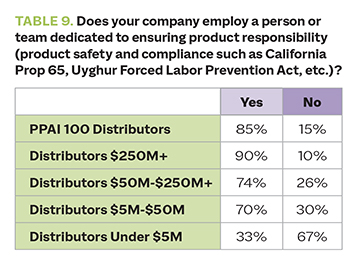
Distributors’ percentages across the board are much lower than suppliers’ percentages, which makes sense considering that the latter are more hands-on in the production process. However, in the promotional products industry, product safety is everyone’s responsibility.
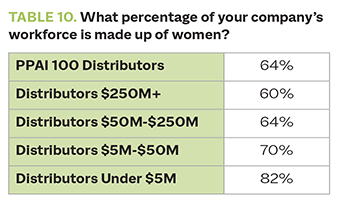
Chris Huebner, president of Bethesda, Maryland-based Mac Mannes, was impressed that the majority of distributors in every category report that half or more of their workforce consists of women. “I’m pleasantly surprised that number is so high,” says Huebner, hopeful that the trend continues.
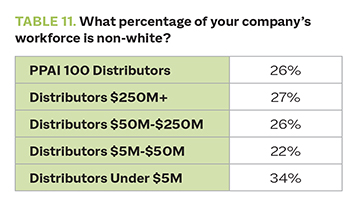
Conversely, there’s plenty of room for improvement when it comes to distributors having a diverse workforce. “Clearly, we have a ways to go in the ethnicity department,” Huebner says.
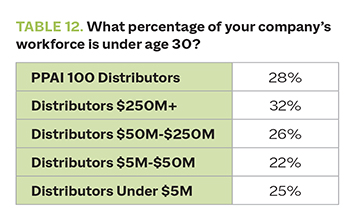
Although the promo industry traditionally skews older, there’s been a push in recent years to inject more youth on both the supplier and distributor side. In order to better understand young consumers’ interests and preferences, it’s wise for distributors in particular to recruit more millennials and Gen Zers who are more aligned with buyers. Of course, to ensure young people will enjoy lengthy, fruitful careers in promo, it’s up to companies to educate and train them on the inner workings of the industry.

